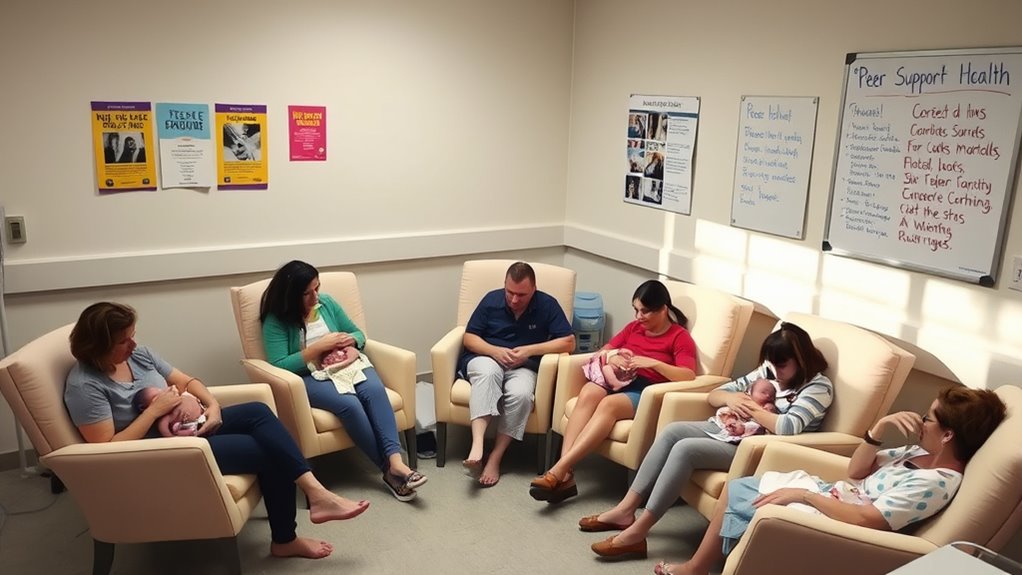During your NICU stay, there are many resources to support your mental health. You can access counseling services, both in hospitals and online, and connect with peer support groups to share experiences and find comfort. Mindfulness techniques and stress management strategies help you cope with overwhelming feelings. Hospital programs and online communities are also valuable. Recognizing signs of anxiety or depression early allows you to seek help promptly. Keep exploring options to build resilience and care for yourself through this challenging time.
Key Takeaways
- Access hospital-based mental health services, counseling, and support programs tailored for NICU parents.
- Join peer support groups—online or in-person—to share experiences and reduce feelings of isolation.
- Utilize online resources, forums, and webinars focused on NICU emotional well-being and coping strategies.
- Recognize signs of anxiety or depression early and seek professional help promptly.
- Develop ongoing self-care routines, including relaxation techniques, rest, and establishing a strong support network post-discharge.
Understanding the Emotional Impact of a NICU Stay

A stay in the NICU can be an overwhelming experience, often triggering a wide range of intense emotions. You might feel fear and worry as you watch your baby hooked up to medical machines, uncertain of what’s to come. Guilt can creep in, making you question if you did something wrong. You may also feel helpless, frustrated, or exhausted from sleepless nights and emotional strain. These feelings are normal, but they can quickly become overwhelming. It’s important to recognize that your emotional response is valid, and that many parents experience similar reactions. Acknowledging these feelings helps you process your experience and begin to cope. Remember, it’s okay to feel vulnerable—your emotional well-being is vital during this challenging time. Understanding the emotional impact of a NICU stay can also help you seek appropriate support services when needed.
Counseling Services and Professional Support Options

Counseling services can provide essential support during your NICU experience, helping you process your emotions and reduce stress. You can access these resources through hospital referrals or community programs tailored for parents like you. Finding specialized support ensures you get the guidance you need to navigate this challenging time.
Accessing Counseling Resources
When steering the emotional challenges of a NICU stay, seeking professional support can provide essential relief and guidance. To access counseling resources effectively, start by asking your healthcare team about available services. They can recommend hospital-based counselors or community providers. Next, consider these steps:
- Contact your insurance provider to understand coverage options.
- Search online directories for licensed therapists specializing in parental mental health.
- Reach out to local or national support organizations for referrals.
- Schedule an initial consultation to find a counselor you feel comfortable with.
- Remember that understanding mental health benefits can help motivate you to seek appropriate support.
Finding Specialized Support
Are you unsure where to find specialized support tailored to your unique needs during your NICU journey? Finding the right help can feel overwhelming, but resources are available. Many hospitals offer dedicated mental health professionals trained in neonatal care. You can also explore community-based counseling centers or online therapy platforms that specialize in parental stress and trauma. To help you navigate options, consider this table:
| Support Type | What It Offers | How to Access |
|---|---|---|
| Hospital Counseling | On-site mental health support | Ask your NICU social worker |
| Online Therapy | Flexible, confidential counseling | Sign up via telehealth platforms |
| Support Groups | Peer connections and shared experiences | Search local or virtual NICU groups |
Additionally, understanding mental health resources specific to neonatal care can empower you to find the support you need.
Peer Support Groups and Connecting With Other Parents

Connecting with other parents through support groups can provide an essential sense of community during your NICU journey. Sharing experiences helps build a strong support network and reminds you that you’re not alone. These connections can offer comfort, advice, and understanding when you need it most. Engaging with support groups can also be a valuable way to access additional mental-health resources tailored for parents in similar situations.
Support Network Benefits
Building a support network can considerably ease the emotional strain of a NICU stay, and connecting with other parents who understand your experience offers invaluable comfort. Sharing your feelings and concerns with others who truly get what you’re going through can reduce feelings of isolation. Here are some benefits:
- Emotional support: You can vent and receive encouragement from those who’ve been there.
- Practical advice: Parents share helpful tips on managing hospital procedures and daily routines.
- Validation: Knowing others face similar challenges reassures you that your feelings are normal.
- Hope and motivation: Witnessing others’ progress can inspire you to stay positive and resilient.
- Staying informed about legislative changes related to parental support can help you access additional resources and relief.
A strong support network helps you feel less alone and more empowered during this difficult time.
Building Connections and Sharing
Forming connections with other parents through peer support groups offers a powerful way to share experiences and find comfort. When you connect with others who understand the NICU journey, you realize you’re not alone in your feelings and challenges. These groups provide a safe space to express fears, frustrations, and hopes, helping you process emotions more effectively. Listening to others’ stories can inspire strength and resilience, while sharing your own can lighten your emotional load. Building these bonds fosters a sense of community and understanding that’s essential during this difficult time. Whether in person or online, support groups create opportunities for empathy, advice, and encouragement, helping you navigate the NICU stay with greater confidence and emotional support. Incorporating emotional support techniques learned from textile art display and connection strategies can further enhance your coping experience during this challenging period.
Mindfulness and Stress Reduction Techniques

When facing the stress of a NICU stay, practicing mindfulness and stress reduction techniques can make a significant difference in your well-being. These methods help you stay grounded and manage overwhelming emotions. Consider trying:
- Deep breathing exercises: Focus on slow, deliberate breaths to calm your nervous system.
- Mindful observation: Take a moment to notice your surroundings without judgment.
- Body scans: Pay attention to physical sensations, releasing tension as you go.
- Guided meditation: Use apps or recordings to lead you through brief relaxation sessions.
- Incorporating mindfulness practices into your daily routine can enhance your emotional resilience and help you stay present during this challenging time.
Incorporating these techniques into your daily routine can reduce anxiety and increase your emotional resilience. Even just a few minutes a day can create a noticeable difference, helping you stay present and centered during this challenging time.
Hospital-Based Resources and Support Programs

Hospitals often offer a variety of resources and support programs designed to help parents navigate the emotional challenges of a NICU stay. Many hospitals provide on-site counseling services where you can speak with mental health professionals trained to address your unique concerns. Support groups, often led by social workers or nurses, allow you to connect with other parents going through similar experiences, offering comfort and shared advice. Some facilities have family resource centers that provide educational materials, relaxation spaces, and peer support. Additionally, hospitals may organize workshops on coping strategies, communication, and self-care. Understanding the importance of dream recall and emotional processing can be beneficial, as engaging in activities like journaling or mindfulness may support your mental health during this time. Taking advantage of these programs can help you feel less isolated, build resilience, and better manage the emotional toll of your baby’s NICU journey.
Online Communities and Virtual Support Networks

Online communities and virtual support networks offer accessible ways to connect with other parents who understand the emotional ups and downs of a NICU stay. These platforms provide comfort, advice, and a sense of belonging when in-person support isn’t available. To make the most of these resources, consider:
- Joining specific NICU support groups on social media platforms
- Participating in online forums dedicated to parental experiences
- Attending virtual meetups or webinars for shared insights
- Sharing your story to both seek support and offer encouragement
- Exploring online communities that focus on mental health and coping strategies tailored for parents of NICU infants
Engaging in these networks helps you realize you’re not alone, reduces feelings of isolation, and offers practical tips from parents who’ve been through similar challenges. Remember, your virtual community can be a crucial source of strength during this difficult time.
Developing Resilience and Self-Care Strategies

Building resilience and practicing self-care are essential for steering through the emotional challenges of a NICU stay. To develop resilience, focus on accepting your feelings without judgment, and remind yourself that your stress is normal. Set small, achievable goals each day to regain a sense of control. Prioritize self-care by carving out moments to rest, hydrate, and nourish yourself, even if briefly. Incorporate simple relaxation techniques like deep breathing or mindfulness to reduce anxiety. Reach out to trusted friends, family, or support groups when you need emotional relief. Remember, caring for yourself isn’t selfish—it’s necessary for your wellbeing and your ability to support your baby. Postpartum care resources can provide additional guidance during this time. Consistent self-care and resilience-building efforts help you navigate this difficult time with strength and hope.
Recognizing Signs of Parental Anxiety and Depression

Recognizing the signs of parental anxiety and depression is essential for seeking help early and maintaining your well-being. You might notice persistent feelings of worry, racing thoughts, or difficulty sleeping. You could also feel overwhelmed, hopeless, or experience sudden mood swings. Pay attention if you find yourself withdrawing from loved ones or losing interest in activities you once enjoyed. Additionally, physical symptoms like fatigue, headaches, or changes in appetite can signal emotional struggles.
Here are some signs to watch for:
- Constant worry or panic attacks
- Persistent sadness or hopelessness
- Withdrawal from social interactions
- Changes in sleep or eating habits
Being aware of these signs helps you seek support sooner, promoting healing for both you and your baby.
Planning for Post-Discharge Emotional Well-Being

Planning for your emotional well-being after discharge is a vital step in ensuring you continue to recover and support your baby’s development. Start by establishing a support network of friends, family, or mental health professionals you trust. Schedule regular check-ins to discuss your feelings and challenges, and don’t hesitate to seek professional help if needed. Prioritize self-care activities like rest, healthy eating, and gentle exercise to boost your resilience. Create a practical plan for managing daily tasks so you don’t feel overwhelmed. Recognize that setbacks are normal, and give yourself permission to ask for help. Staying connected with your support system and actively addressing your mental health will help you navigate post-discharge life with confidence and strength.
Frequently Asked Questions
How Can I Access Emergency Mental Health Services During My NICU Stay?
If you’re feeling overwhelmed and need emergency mental health services, don’t hesitate to ask for help right away. You can contact hospital staff or your healthcare provider for immediate support, as they can connect you to crisis hotlines or mental health professionals. Many hospitals have on-site counselors or resources available 24/7. Remember, reaching out quickly can provide the urgent help you need to cope during this challenging time.
Are There Specific Resources for Non-English Speaking Parents?
Did you know over 25% of parents in NICUs face language barriers that can add stress? If you’re a non-English speaking parent, many hospitals offer translation services or bilingual mental health professionals to support you. You can ask your care team about interpreter services, translated materials, or culturally sensitive counseling options. These resources aim to guarantee you feel understood, supported, and empowered during this challenging time.
What Financial Assistance Options Are Available for Mental Health Care?
You might wonder about financial assistance for mental health care. Many clinics and community programs offer sliding scale fees based on income, making therapy more affordable. Some states provide Medicaid coverage that includes mental health services. Additionally, non-profits and support organizations often have grants or free resources. Check with local health departments or online resources to find programs tailored to your financial situation, ensuring you get the support you need.
How Can I Involve My Partner or Family in My Emotional Support Plan?
To involve your partner or family in your emotional support plan, start by openly sharing your feelings and needs. Encourage honest conversations about how they can help and listen actively to their suggestions. You can also organize regular check-ins or joint activities to strengthen your support system. Remember, their involvement can provide comfort and reassurance, making your mental health journey more manageable and less isolating.
What Are Effective Ways to Communicate My Needs to Healthcare Providers?
Imagine you’re in a hospital room, feeling overwhelmed, and need clearer guidance. To communicate effectively with healthcare providers, be direct and specific about your concerns. For example, say, “I need more information about my baby’s care plan” instead of vague statements. Write down questions beforehand, and don’t hesitate to ask for clarification. Remember, healthcare providers are there to support you, so clear communication helps make sure your needs are met.
Conclusion
Finding your way through the NICU journey is like sailing through unpredictable waters, but remember, you’re not alone on this voyage. Seek out support, lean into your resilience, and let resources be your guiding stars. By caring for your mental health, you’ll find strength to weather the storm and embrace calmer seas ahead. Trust in the process, hold onto hope, and know that, with time, your heart will find its steady rhythm once more.









